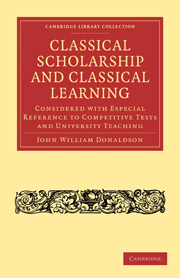 Classical Scholarship and Classical Learning
Classical Scholarship and Classical Learning II - Competitive Tests
Published online by Cambridge University Press: 05 October 2010
Summary
In the discussion which has occupied us hitherto, I have endeavoured to show that Classics and Mathematics, as representing the two departments in the old school of liberal arts, are still the best foundation of University teaching. It is my next business to examine these two departments in their relation to one another, and to prove that, with a view to the competitive tests in the Universities and in the Civil Service, classical literature deserves the preponderance of encouragement, which it receives in general and at Oxford, and which it will, ere long, receive at Cambridge also.
As a first argument in favour of this position, it would be quite fair to urge that, as a fact, it has been found impossible to retain for mathematics the supremacy which they had gained at Cambridge; and classical studies, as I have mentioned above, have gradually raised themselves to an equal footing, if they have not virtually gained the upper hand. The relative amount of encouragement, which has been given by this University to mathematics and classics respectively, was made a subject of dispute between two eminent writers a short time since. For while Sir W. Hamilton maintained that “the University of Cambridge bestows not only a special, but a paramount, not to say an exclusive encouragement on the mathematical sciences,” Dr Whewell, on the other hand, averred that “it is impossible to refer to any record of the prizes which the University bestows, without seeing that there is a much greater number offered and given in other subjects than in mathematics.”
- Type
- Chapter
- Information
- Classical Scholarship and Classical LearningConsidered with Especial Reference to Competitive Tests and University Teaching, pp. 72 - 125Publisher: Cambridge University PressPrint publication year: 2010


